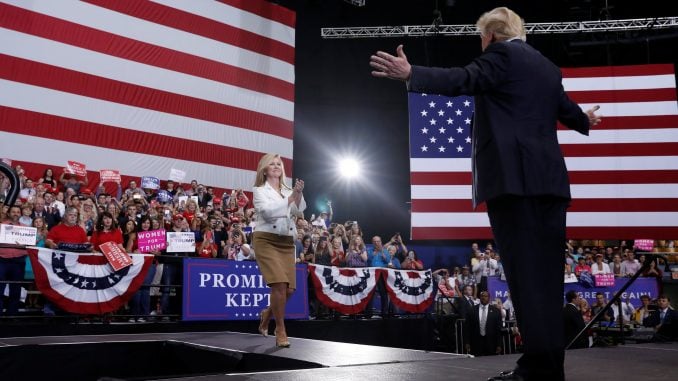
RALEIGH — This week marks six months until the 2018 midterm elections, potentially determining which party will control Congress. Democrats need to win 23 seats nationwide in November to wrest control of the U.S. House of Representatives from Republicans but are defending five seats in the Senate with at least two others considered a toss-up. They are counting on a “Blue Wave” to sweep them into power, saying that the Resist anti-Trump movement will bring their party to the polls.
However, record low unemployment, North Korea coming to the negotiating table and end of the Obamacare mandate has some saying that Blue Wave may not be coming.
“I think the blue wave was kind of a creation of the Democrats and the mainstream media,” said Marc Rotterman, political analyst and host of “Front Row with Marc Rotterman” on UNC-TV. “It’s clearly dissipated. It was based on the generic ballot which at the time showed [Democrats] anywhere from 8 to 15 points up, and now it’s a virtual tie, within the margin of error.”
Tuesday’s primaries in eight states, Mississippi, Alabama, Montana, South Dakota, New Mexico, New Jersey and California, had both parties claiming victory.
“As we await final results in multiple districts, it is clear that Democrats are in a stronger position than ever to take back the House, and winning districts in California will be central to that path,” said Tyler Law, a spokesman for the Democratic Congressional Campaign Committee, in a Wednesday email.
But solid turnout by Republican voters on Tuesday underscored the challenges Democrats will face in trying to win in the conservative areas like suburbs of Los Angeles and Sacramento, as well as in rural areas that supported Trump in the presidential election two years ago.
“Great night for Republicans!” Trump tweeted on Wednesday. “So much for the big Blue Wave, it may be a big Red Wave. Working hard!”
Republicans control the Senate by a two-seat majority, but political analysts see Democrats as having a weaker chance of turning the balance of power there since they must defend a bevy of seats in Republican-leaning rural states including Indiana, Montana, North Dakota and West Virginia.
FIGHT GOES INTO CALIFORNIA
Democrats see California and New Jersey as their best shot to take the House. In California, Democrats have targeted 10 of the 14 seats held by Republicans. However, Tuesday’s contests will determine whether Democratic candidates in the swing districts are moderate or progressive.
California saw an unusually large number of Democrats vying for office, many energized by anger over Trump administration policies restricting immigration and abortion access as well as easing environmental regulations.
The large field could have undercut the party’s chances for success since the state’s system for choosing candidates allows the two top vote-getters to advance to the general election regardless of party. Splitting of the Democratic vote could have led to two Republicans running in the general election.
Most other states have rules allowing one candidate from each party into the general election.
Democrats had eight candidates on the ballot in the race to unseat Republican Representative Dana Rohrabacher, who has served in Congress since 1989 and was re-elected in 2016 in a southern California district that also chose Democrat Hillary Clinton for president.
Harley Rouda, a real estate executive and first-time congressional candidate with the support of the Democratic Congressional Campaign Committee, looked poised to challenge Rohrabacher based on state election data.
Democrat and venture capital executive Josh Harder held a narrow edge in a central Californiadistrict over Republican Ted Howze, a long-time local government official. Harder or Howze will challenge four-term incumbent Republican Jeff Denham.
California Republican gubernatorial candidate John Cox won a chance to face Democrat Gavin Newsom in November. Analysts saw that as a positive for the Republican Party, reasoning that not having a candidate on the ballot for governor could have diminished turnout among party supporters.
CALLING IN THE BIG GUNS
President Trump campaigned last week for Tennessee Republican Senate candidate Marsha Blackburn, who is trailing despite her endorsement from the seat’s retiring Republican Sen. Bob Corker. The eight-term congressman (she’s reportedly directed that she prefers the term congressman to congresswoman, in the interest of avoiding political correctness) has fought against abortion and for fiscal responsibility.
Her opponent, Democrat and former Tennessee Gov. Phil Bredesen, led Blackburn by double digits in April, but that lead has closed to 3 points over the last month.
Meanwhile, former President Barack Obama is headlining high-dollar fundraisers for the Democratic National Committee. On June 28, a gala dinner at an undisclosed location will bring supporters at a starting ticket price of $2,700 per person. The highest priced ticket goes to those who write checks or raise $100,000, which includes premium seating, a photo reception, host reception, membership in the DNC finance committee and admission to two other “marquee events,” according to an invite.
Obama was in Los Angeles for a fundraiser in May for Sen. Claire McCaskill (D-Mo.) at the home of Jeff Shell, with other co-hosts including J.J. Abrams, Jeffrey Katzenberg and Steven Spielberg. He also headlined an event in March at the home of Tampa Bay Buccaneers co-chairman Ed Glazer.
And while McCaskill and other Democrats have taken some criticism from their Republican challengers for taking money from the Hollywood elite, GOP senators have not shied away from taking high-profile Hollywood money. Sen. Thom Tillis (R-N.C), Sen. Dean Heller (R-Nev.), and Sen. Cory Gardner (R-Colo.) headlined a May 2 event for the National Republican Senatorial Committee that was hosted by MPAA chairman Charles Rivkin and major studio chiefs.
“The Democrats, in my view, have no message — resist is not a message,” said Rotterman. “Just being against Trump is not a message, and by and large Republicans are falling in behind Trump.”
Republicans hope that economic milestones and improvement with North Korea will motivate people to keep the Republican majority, while Democrats say that anger toward Trump and worry over deportations will motivate the blue base.
“Most elections come down to how do people feel about their pocketbook,” said Rotterman. “How do they feel about their personal situation? If they’re feeling better, that has dramatically changed the equation on any type of blue wave, which I think just isn’t coming together at this point.”
Voters in five more states, Nevada, Maine, North Dakota, South Carolina and Virginia, on June 12 will choose candidates for their states’ November congressional races.


